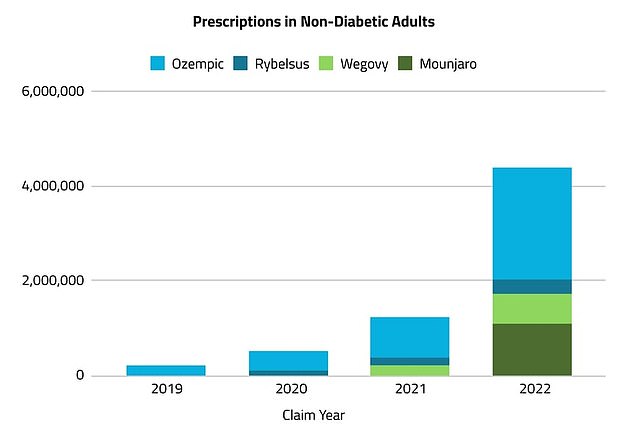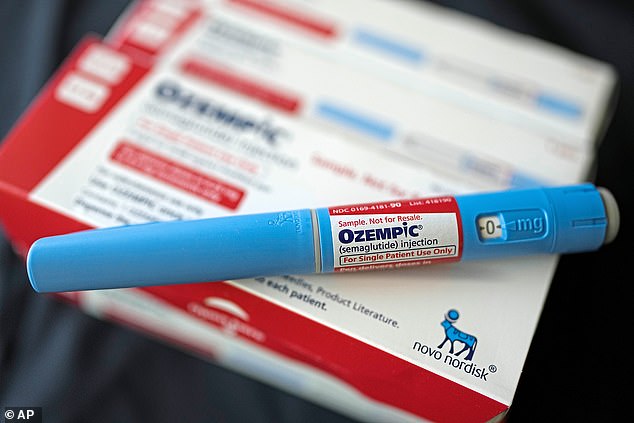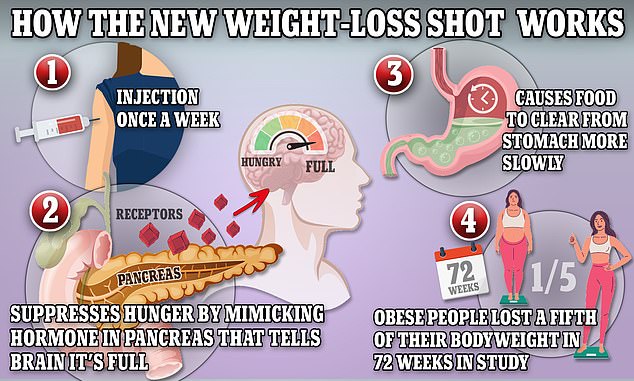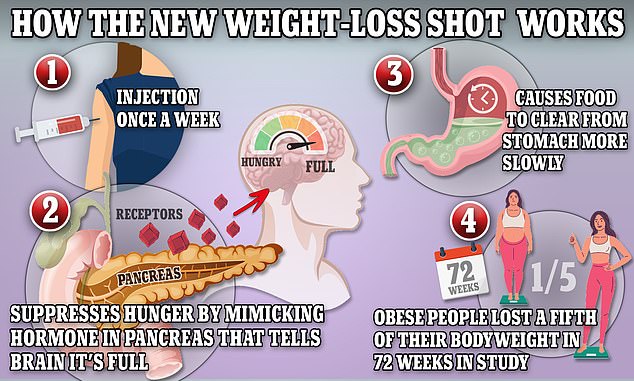The breakthrough drug Ozempic that has helped over 50 million Americans lose weight has also helped smokers and problem drinkers curb their cravings.
A smattering of trials involving rats and humans, as well as a growing number of anecdotal reports, have shown that Americans prescribed semaglutide – the active ingredient in the diabetes drug Ozempic – saw their alcohol and nicotine use gradually drop off.
The drug has also been shown to help its millions of users curb other compulsive behaviors besides drug and alcohol use, from the seemingly innocuous like nail biting and binging sweets to potentially ruinous impulsive spending and gambling.
Scientists believe that the drug does more than just regulate blood sugar and make you feel satisfied quicker when eating. It can control the brain’s complex reward pathway that floods the brain with a rush of dopamine when something good happens, such as biting into a delicious cookie, and encourages you to eat more.
The potential use of the injectable weight loss aids for addictive behaviors would change the landscape of treatment, which is often limited to just a handful of government-approved medications that fail to prevent relapses long-term.

Henry Webb, from North Carolina, finished a two-month course of Wegovy after hitting his weight goal. In the past, he would consistently have a couple of drinks in the evening, but said: ‘On the medication I had zero desire for that’

Staci Rice (pictured), 40, said that she can no longer stomach coffee or Kit-Kats after using Wegovy

In 2022, more than 5 million prescriptions for Ozempic, Mounjaro, Rybelsus, or Wegovy were written for weight management, compared with just over 230,000 in 2019. This marks an increase of more than 2,000 percent, according to market research firm Komodo Health
Dr Chris Palmer, a Harvard psychiatrist who focuses on the connection between mental health and metabolism told DailyMail.com: ‘The exact same brain circuits that are regulating our food intake are also playing a role in our addictive behaviors.’
Medications like Ozempic and Wegovy that help people shed excess pounds are called GLP-1 agonists, which mimic the GLP-1 hormone naturally produced by the gut in response to eating.
This hormone curbs hunger and slows the the rate at which a person’s stomach empties, leaving them feeling fuller for longer. GLP-1 agonists might also decrease the brain’s response to rewarding stimuli, including delicious food and potentially other substances like alcohol and nicotine.
Dr Palmer added: ‘The general rule of thumb is substances that promote our survival and or ability to reproduce, trigger that [dopamine reward] system. Addictive substances trigger that system and in a way it becomes circular logic.
‘So what makes a substance addictive? If it triggers that system. And so all of those things – alcohol, nicotine, food, especially delicious food high in sugar and fat –those types of food tend to stimulate this system much more. Over time, if you’re stimulating it repetitively, or at a higher kind of intensity than it’s designed to be like cocaine would do, you actually are in a way, desensitizing the system.’
The most commonly reported side effects of semaglutide drugs marketed as Wegovy and Ozempic affect the gastrointestinal tract, causing constipation, nausea, and diarrhea.
Evidence of semaglutide’s anti-addiction properties in humans is scant, but there have been plenty of anecdotal reports of users suddenly losing their taste and tolerance for alcohol.
Henry Webb, from North Carolina, finished a two-month course of Wegovy after hitting his weight goal.
In the past, he would consistently have a couple of drinks in the evening, but said: ‘On the medication I had zero desire for that.’
Another semaglutide user named Staci Rice, 40, said that her favorite chocolate candy, Kit Kats, are now repulsive to her.
Meanwhile, Jamel Corona from Chicago successfully dropped 60 pounds on Wegovy after just 15 months.
Ms Corona went from being a social drinker, consuming a glass of wine after work or a few beers during a night out, to completely losing her tolerance from alcoholic beverages.
She told Today that alcohol is now a ‘hard pass’ for her, adding: ‘I can’t tolerate beer at all so I haven’t had any beer in months. … I don’t remember the last time I’ve had wine. It’s just too sweet.’
She recounted an incident at a brewery where she and friends were celebrating her husband’s birthday. She had three beers in a four-hour period and got violently ill, the first time she has ever gotten physically sick from alcohol.
Ms Corona said: ‘I just had a really horrible reaction to it. And I was like, I never want to feel like that again.’
Another Ozempic user saw their gambling addiction gradually subside, an addiction spurred on by heavy Adderall use.
The user said: ‘I first took Ozempic on January 15th. Almost immediately the thought of gambling seemed so obviously stupid – not just dumb financially but a waste of time. It actually seemed boring to me for the first time ever.
‘Now all the addictions are gone and I’ve lost 50 lbs and losing steadily. It’s been almost like a literal miracle for me!’
And while not every patient will see their penchant for smoking, drinking, or other compulsive negative behaviors taper off, it has happened enough that addiction researchers are paying attention.

Ozempic was initially approved for diabetes management while being prescribed ‘off label’ for weight loss. It has since become a drug worth tens of billions for its manufacturer, Novo Nordisk, which makes a higher-dose version called Wegovy

Wegovy and Ozempic work by triggering the body to produce a hormone called glucagon-like peptide-1 that is released naturally from the intestines after meals
Nearly 30 million American teens and adults struggle with alcohol use disorder while 24 million Americans are hooked on nicotine.
That means millions of people who engage in these problematic behaviors who do not necessarily have to drop pounds could potentially benefit from semaglutide.
And smokers who have long struggled to quit could soon see a light at the end of the tunnel.
A 2023 report in the journal Psychopharmacology reported that rats addicted to nicotine who were given a GLP-1 receptor agonist drug called liraglutide were less interested in nicotine, helped them avoid overeating when they stopped taking nicotine, and prevented them from gaining too much weight.
For now, the strongest evidence lay in animal studies. Another such study was published in the biomedical research journal JCI Insight in May 2023.
American and Austrian researchers set out to test how different amounts of semaglutide can affect the way mice and rats drink alcohol, particularly when binge-drinking. They hypothesized that semaglutide might make rats and mice drink less alcohol and sugary drinks without affecting how much non-sugary things they drink.
Semaglutide injections at all doses helped mice drinking sweetened alcohol drink less than those in the control group.
They also found that at certain doses – 0.003 mg/kg, 0.01 mg/kg, 0.03 mg/kg, and 0.1 mg/kg – semaglutide reduced alcohol intake compared to the control group.
Even mice who were injected with semaglutide but not given alcohol saw their consumption of sweetened drinks fall.
In another study reported just last month in the journal eBioMedicine, researchers at the University of Gothenburg tested semaglutide on dozens of rats which had been exposed to alcohol and had grown to enjoy it.
They were allowed to drink to their heart’s content. The rodents taking semaglutide consumed half as much alcohol compared to those on a placebo.
After a week deprived of alcohol in order to heighten their cravings, alcoholic rats given the medication still drank much less, which could hold massive potential for the treatment of alcoholism that often entails repeated relapses.
